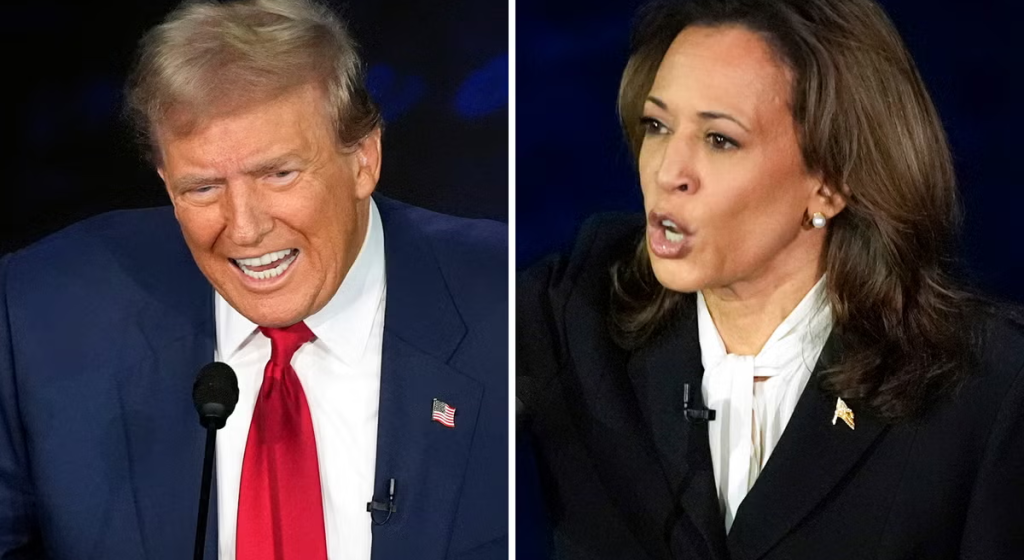America witnessed a sharp ideological divide in the recent presidential debate between Donald Trump and Kamala Harris. It was not just a contest of words but a clash of opposing worldviews. Trump painted a dark picture of a country in decline, while Harris projected optimism and a hopeful path forward. These two contrasting narratives became the focal point of the night, leaving the question: Is the U.S. failing under current leadership, as Trump claims, or is it on the verge of a revival under Harris‘s vision?
Trump wasted no time framing the debate around what he called America’s “serious decline.” His rhetoric emphasized that the U.S. was being laughed at on the global stage, lacking leadership and respect from foreign nations. Trump claimed his experience with world leaders, his hardline stance on China, and his economic policies were what the country needed to regain its strength. He reiterated that the current administration, and by extension Harris, was responsible for a failing nation. His grim tone wasn’t just limited to foreign policy; he pointed to domestic struggles; ranging from economic inflation to crime, as evidence of America’s fall from grace.

Harris, on the other hand, brought a sense of optimism. Unlike Trump, she focused on growth and unity. She positioned herself as a leader who understands everyday struggles and offers real solutions. For example, she proposed a $50,000 tax deduction for small business startups and down payment assistance for first-time homebuyers. Moreover, her message wasn’t just about policy—it was a call for unity. She argued that Americans have more in common than what divides them.
Meanwhile, the contrast in economic policy could not have been clearer. Trump highlighted his 2017 corporate tax cuts and vowed to extend them. In addition, he promised new tariffs on imports, especially from China. He claimed these moves would bring back jobs and boost the economy. However, many economists warned that such tariffs could raise consumer costs—by as much as $4,000 per year for the average family. Despite this, Trump dismissed their concerns. Instead, he argued that the tariffs would bring in billions and ultimately benefit the U.S. economy.

Harris, by contrast, focused on easing the financial strain on working families. She proposed expanding the child tax credit and offering immediate relief through targeted tax cuts. She positioned herself as a champion of small businesses and families—groups she said Trump’s corporate-friendly policies had ignored. Her message was clear: build the economy from the ground up, not the top down.
The debate grew most heated when abortion came up. Harris openly criticized Trump’s role in overturning Roe v. Wade. She vowed to sign a law restoring abortion rights if Congress passed it. Trump, on the other hand, avoided a clear stance. He refused to say whether he’d veto a national abortion ban. While he expressed support for a six-week ban, he didn’t explain his broader position. That left many wondering how far he’d go to restrict abortion if re-elected.

Race relations also took center stage. Harris called out Trump’s racially charged past, from the Central Park Five case to recent comments about her identity. Trump doubled down on some remarks but quickly shifted to the economy. Harris faced the issue directly. Trump seemed uncomfortable. Their responses showed clear differences in how they approach one of America’s most sensitive topics.
As the debate ended, both gave final remarks that showed their opposing worldviews. Harris spoke of an inclusive America built on opportunity and justice. She emphasized the resilience of the American people and the need for strong, fair leadership. Trump painted a bleak picture of the country. He warned of collapse and claimed only his return could stop it.

The night ended without a clear winner. Voters now face a choice between two very different futures. Trump promised a return to his tough, protectionist policies. Harris called for unity and economic empowerment for everyday Americans. This debate wasn’t just about personalities. It was a referendum on the kind of country America wants to become.
The answer, like the outcome of the debate, remains unresolved.
_____________________________________
Thank you for your time here. This means a lot to us. If you are passionate about driving change through workshops, send us an e-mail @ info@insidesuccess.com. Find other related articles on our website and follow us on Instagram @InsideSuccessNigeria to get more updates



Leave a Reply